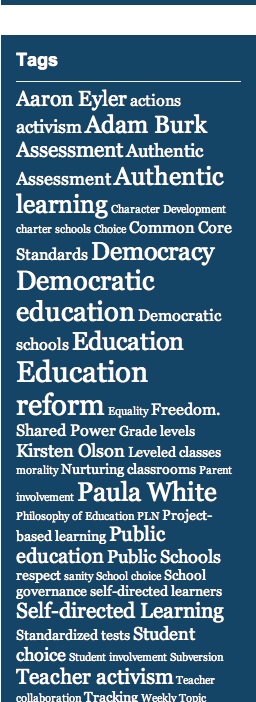I want to invite anyone who checks in here also make their way over to Cooperative Catalyst, a dynamic ongoing online discussion with a group of educators who are teachers and thinkers deeply interested in educational reform. 
It’s a group that’s just getting started. It…
- raises powerful questions collectively
- decides in true democratic fashion (messily) what the topic of the week is going to be
- is supportive and far-thinking.
Want to talk about important things? Go here and help make this a meaningful place for you.


Thanks for this review, it’s good to hear another heart valuing freedom. What is your sense of librarian’s role in the “revolution”–and how can people find their way (their own, internal-locus-of-control way) through the internet with so much chaos and redundancy in the organization of this information?
Thanks for the work you do, I’m looking forward to reading your book, recommended to me by Melia Dicker.
–Joshua
Hey Joshua, It’s great to hear from you and call you a colleague. This is a great question: the role of the librarian in the revolution, since the revolution revolves around being able to find and meaningfully synthesize vast swaths of information. Since it sounds like this is your role, what can we learn from you.
And on another blog today I was just trying to write about this internal-locus-of-control issue as central to new metaphors for learning. Again, how do you experience your own learning as you’ve made a transition to internal locus of control?
I look forward to hearing from you!
Hi Kirsten,
thanks for your reply. I am not a librarian, but I have met a few librarians (I can’t remember why I ended up going to a librarians’ meetup at some point) and they were all talking about the perils and promise of web 2.0, how to make it possible for people to find things in the sea. I have a sort of intuitive way of fumbling around the internet that sort of works, but ironically I’ve found face-to-face converations essential in finding some major resources–particularly learning about the existence of wikiversity, for example.
My finding my internal locus of control is a life-long quest, I would say, and one title that’s been extremely helpful is Breaking the Rules, by Kurt and Patricia Wright. They suggest that asking what’s right and then analyzing _why_ it’s right–about oneself and one’s environment–is essential to reclaiming freedom, and that our culture has taught most of us (esp. in school) to ask What’s wrong and How can I fix it?, which are questions that the analytical brain will attempt to answer in the absence of necessary input from the feeling- and pattern-languaged right brain. Most “right-brain” books disparage the left brain and analysis, and try to get us to “shut off” hte left brain. this one points out that it is essential to complete functioning, but you need to use it in the opposite way from what’s been culturally conditioned. The result is increases in productivity and pleasure, and access to the emotional energy we had as three-year-olds. Would love to hear your response to this (so far) little-known work.
What about you?
Best,
Joshua
Joshua, First, I just ordered BREAKING THE RULES, a book I’ve never heard of. It sounds great and is exactly what I’ve been thinking about for awhile: the intersection of neurodharma (Buddhism, positive psychology, cognitive science) and educational reform. I just gave a presentation at a conference on pleasure in learning, and how we moralize pleasure in our culture, especially around learning, and that to me this is somehow key to thinking about new ways to do school. That our whole model is off, and that we need to start thinking about places where adults come together with children for thinking/learning as about settings of HOSPITALITY and COSMOPOLITANISM.
At any rate, for me too the internal locus of control is a lifelong quest. I grew up in a very academic-loving, expert worshipping, whoever knows the most “wins” kind of microculture, with lots of judgment and competition thrown in for good measure. Even as I recognized the intense negativity and limitations of that environment, it seeped into my spiritual groundwater. Now I’m in the Buddhist place of accepting what is (in terms of my own ecology), as I feel myself really changing around this. But lifelong quest. Right on.
A major intellectual turning point for me was reading critical theory and Ivan Illich, on institutions and their hold on those captured by them/in them. Developing some global awareness of the power of institutions to shape everything–seemingly every possibility–helped me develop my own criticality and capacity to stand apart. I am looking forward to the INTUITION messages in BREAKING THE RULES.
It’s great to be in dialog with you.
Appreciatively,
Kirsten